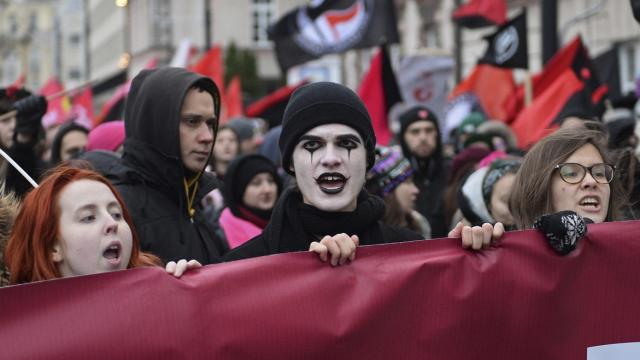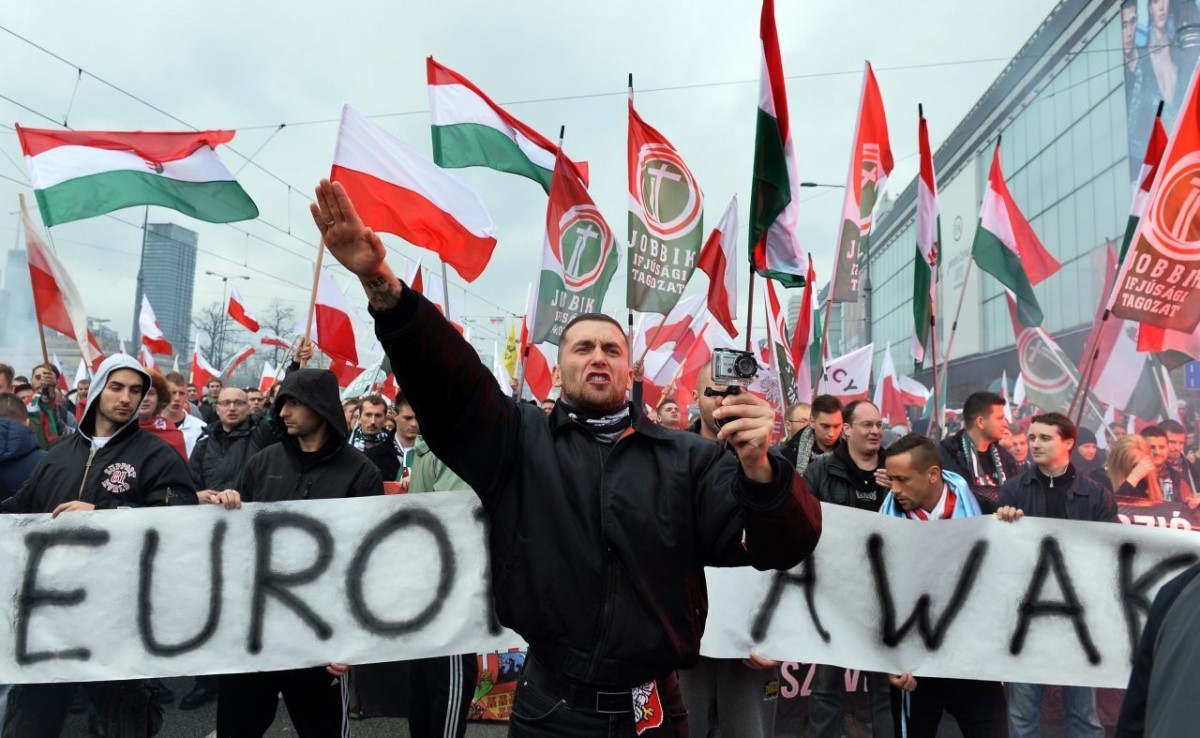
Last month, Poland once again made international headlines when its Independence Day demonstrations – normally a moment dedicated to celebrating the return of the country's sovereignty – were overwhelmed by 60,000 far-right protestors. Holding up placards with signs like "Europe will be white or uninhabited" and screaming “Pure Poland, white Poland!” as they proudly waved White Power flags, the Polish far-right were also joined by foreign representatives of other extremist groups.
According to Adrian Bartos, spokesman for the All Poland Youth, more than 500 representatives of other nationalist parties from Spain, Germany and Hungary attended the demonstration. In his interview with Business Insider, Bartos said of the foreign far-right contingent:
"They are overjoyed by it, and they don't see the kind of mobilization we see in Poland in other European countries. I think this is happening in Poland because there is strong national identity among the inhabitants, the citizens of our country, and basically the majority see what is happening in the West."
The events "happening in the West," according to Bartos, include a steep rise in crime and sexual assault in Sweden and Germany, along with other countries that have accepted an influx of refugees in recent years. While the numbers of incidents continue to be inflated, they remain a rallying cry for the new European isolationist movements.
The hijacking of Independence Day by the far right even seemed to be lauded by the Polish government, with Polish Minister of the Interior Mariusz Blaszczak stating, "It was a beautiful sight... [We] are proud that so many Poles have decided to take part in a celebration connected to the Independence Day holiday."
One of the more curious slogans uttered, along with White Power chants, was "We Want God!", part of the chorus of an old religious song that was referenced by U.S. President Donald Trump during his visit last month to Poland. According to Rafal Pankowski, a sociologist and member of the anti-extremist association Never Again:
“We know that Donald Trump is not the most religious man, and I think that most of the organisers are not very religious, either...[but] they use Christianity as a kind of identity marker, which is mostly about being anti-Islam now.”
When asked to elaborate his views, Blaszczack, the Interior Minister, glossed over the overtly nationalist insignia and extremists visible at the rally. The sentiment seemed to be shared even by protest participants who shrugged off the alarming nationalist presence.
"I'd say some people here do have extreme views, maybe even 30 percent of those marching, but 70 percent are simply walking peacefully, without shouting any fascist slogans," participant Kamil Staszalek told the BBC.
The November demonstration was met by a peaceful counter-protest led by anarchist groups, anti-fascist organizations and LGBT rights advocates, who mustered some 2,000 participants. Lidia Domańska, a member of the Warsaw Antifascist Collective, later stated why the groups were unable to more actively intervene in the far-right demonstration. "The Independence March Association, which has huge sums of money from businessmen and right-wing politicians, has the resources to invite fascists and neo-Nazis from all over Europe," she said.
During the course of the demonstration, police arrested 45 counter-protesters. No arrests were made among the extremist protesters, even after reports were filed about a group of nationalists who assaulted a group of women waving a "Stop Fascism" banner.
The events in Poland, however, only reflect a small part of the much larger picture that is manifesting currently in Europe. Motivated by the common enemy that is the E.U. with its openly international and pro-immigration policies, the new isolationist groups have fashioned themselves as an international political force bent on defending the ethnic identities of people on the Old Continent against an Islamic incursion.
This rebranding has gone a long way toward bolstering the popularity of far-right parties in Central Europe, giving organizations like the PVV a boost in recent polls in the Netherlands, allowing the Austrian FPOe to nearly snatch the presidency and catapulting parties like the Hungarian Jobbik and the Bulgrain United Patriots into top contender spots in coming elections. Even in Germany, where an Alternative for Deutschland (AfD) victory had been considered impossible, extreme nationalists are starting to gain traction.
At the movement's core, the far-right is speaking to a European population that is feeling confused by the blink-and-you'll-miss-it pace of international politics, let down by the disastrous and impersonal economic policies of the European Union, and in desperate need to preserve a cultural identity they feel is under attack.
Many speculate that the resurgence of the far-right could provoke Europe's left to finally abandon its liberal approach in regard to extremism and reassure voters that more than their identity is at stake if they side with the growing fascist movements. As for the European Union, perhaps this marks the clearest moment yet for politicians to stop what they're doing and pay real attention to the direction the continent is taking. For if the technocratic policies of Brussels are allowed to continue as they are, perhaps the Union's days are truly numbered.
3 WAYS TO SHOW YOUR SUPPORT
- Log in to post comments












